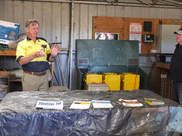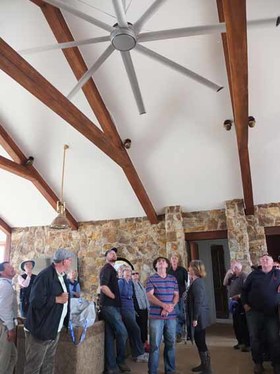 Trevor Robotham explains a battery storage system.
Trevor Robotham explains a battery storage system. By Catherine Watson
WHEN it comes to renewable energy, French Islanders have a lot to teach us. With no electricity supplied to the island, they’ve always lived “off the grid”.
WHEN it comes to renewable energy, French Islanders have a lot to teach us. With no electricity supplied to the island, they’ve always lived “off the grid”.
For decades, they used diesel generators to power their homes. More recently, most are using a range of wind and solar.
Now, with the cost of battery storage systems starting to drop, many mainlanders in rural areas are weighing up the costs and benefits of becoming self-sufficient.
About 25 Bass Coast residents jumped at the opportunity to learn more from the French Islanders when the council and Bass Coast Landcare ran a Future Homes tour to the island last month.
Two experts accompanied the tour: Trevor Robotham has designed and installed many of the systems on French Island, and Brad Shone has worked in the field of household renewable energy for many years.
First stop was the home of long-term residents Alison Pitt and Jane Unwin, who rely on solar and wind power to run their home, olive farm and factory. The electricity they generate is stored in a bank of batteries in their shed. The battery system cost about $10,000. Alison said their first system had lasted 15 years “and probably would have lasted longer if we’d known how to look after it”.
Trevor, who designed, installed and occasionally does repairs and maintenance on the dual solar/wind system, explained the technology.
The windmill generated the most interest among participants because it was the least understood of the technologies. Trevor explained the simplicity of the system and its great advantage: when the skies are dark and the solar is struggling, the wind is usually blowing on the island!
Alison showed everyone around her house explaining the sustainable aspects while Brad provided some great information and answered questions about all sorts of ways people can ensure the energy they create is kept and used most efficiently in the home.
Next stop was Mike Gearon’s very large new home on the coast, which was recently filmed for the Grand Designs TV program. Mike shared the story of his build and the design features that will eventually help to lower energy waste, and he and Trevor explained the wind/solar system installed to run this house.
Mike’s feature fireplace in the living room has been adapted to supply heat to other rooms in the house.
Trevor commented that renewable energies were now clearly a cheaper – not to mention more environmentally friendly – way of making electricity than deisel generators, although some of the more conservative people on the island had resisted change for a long time. He said he knew the war was won when one oldtimer rang him to come and install a solar system.
Interestingly, although this is clearly a luxury home, where there has been no stinting, the owners have chosen to go without air conditioning.
One of the features that attracted most interest was an enormous custom-made ceiling fan in the enormous living room. Another feature was designed and engineered by Mike himself: a feature fireplace in the living room has been adapted to supply heat to other rooms in the house.
Mike and his wife are not yet living in the house, so the true test of the system is yet to come, but the beauty of these systems is that they can be adjusted and added to if necessary.
The final stop was the island’s general store, which is powered by solar energy backed up by a diesel generator. Brad was able to offer the owner a couple of cost-saving tips: in summer, covering the freezer with a thick blanket at night would conserve power, as would turning off the drinks fridge overnight.
It was a day of memorable experiences and new friendships, where participants gained a huge amount of knowledge about renewable energy, energy efficiencies and how they can be applied.
Bass Coast residents can get free advice about renewable energy options, including what system would suit your house, from Positive Charge on (03) 9385 8555. This is a free service offered by the council to assist residents who would like to install renewable energy systems.
Now, with the cost of battery storage systems starting to drop, many mainlanders in rural areas are weighing up the costs and benefits of becoming self-sufficient.
About 25 Bass Coast residents jumped at the opportunity to learn more from the French Islanders when the council and Bass Coast Landcare ran a Future Homes tour to the island last month.
Two experts accompanied the tour: Trevor Robotham has designed and installed many of the systems on French Island, and Brad Shone has worked in the field of household renewable energy for many years.
First stop was the home of long-term residents Alison Pitt and Jane Unwin, who rely on solar and wind power to run their home, olive farm and factory. The electricity they generate is stored in a bank of batteries in their shed. The battery system cost about $10,000. Alison said their first system had lasted 15 years “and probably would have lasted longer if we’d known how to look after it”.
Trevor, who designed, installed and occasionally does repairs and maintenance on the dual solar/wind system, explained the technology.
The windmill generated the most interest among participants because it was the least understood of the technologies. Trevor explained the simplicity of the system and its great advantage: when the skies are dark and the solar is struggling, the wind is usually blowing on the island!
Alison showed everyone around her house explaining the sustainable aspects while Brad provided some great information and answered questions about all sorts of ways people can ensure the energy they create is kept and used most efficiently in the home.
Next stop was Mike Gearon’s very large new home on the coast, which was recently filmed for the Grand Designs TV program. Mike shared the story of his build and the design features that will eventually help to lower energy waste, and he and Trevor explained the wind/solar system installed to run this house.
Mike’s feature fireplace in the living room has been adapted to supply heat to other rooms in the house.
Trevor commented that renewable energies were now clearly a cheaper – not to mention more environmentally friendly – way of making electricity than deisel generators, although some of the more conservative people on the island had resisted change for a long time. He said he knew the war was won when one oldtimer rang him to come and install a solar system.
Interestingly, although this is clearly a luxury home, where there has been no stinting, the owners have chosen to go without air conditioning.
One of the features that attracted most interest was an enormous custom-made ceiling fan in the enormous living room. Another feature was designed and engineered by Mike himself: a feature fireplace in the living room has been adapted to supply heat to other rooms in the house.
Mike and his wife are not yet living in the house, so the true test of the system is yet to come, but the beauty of these systems is that they can be adjusted and added to if necessary.
The final stop was the island’s general store, which is powered by solar energy backed up by a diesel generator. Brad was able to offer the owner a couple of cost-saving tips: in summer, covering the freezer with a thick blanket at night would conserve power, as would turning off the drinks fridge overnight.
It was a day of memorable experiences and new friendships, where participants gained a huge amount of knowledge about renewable energy, energy efficiencies and how they can be applied.
Bass Coast residents can get free advice about renewable energy options, including what system would suit your house, from Positive Charge on (03) 9385 8555. This is a free service offered by the council to assist residents who would like to install renewable energy systems.
